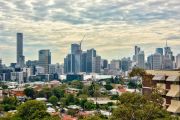
Student caps threaten accommodation work, builder Richard Crookes says
Federal government plans to crimp foreign student numbers – which the property industry says will do little to lower rents and improve affordability – have also prompted universities to reconsider planned student accommodation projects, Richard Crookes Construction says.
The Sydney-based contractor, whose owners gave it a $30 million capital injection in February, said conditions in the wider market had stabilised and the costs of some imported materials were even falling, but its $15 billion pipeline of projects could be hit as a result of the student caps.

Richard Crookes, which is building a three-tower, 732-bed, purpose-built student accommodation development in Sydney’s Macquarie Park for Centurion Properties and has other projects for UniLodge in Kensington and Wee Hur in Redfern, said universities were reconsidering their needs.
“They’re all a bit nervous about the caps,” chief executive Jamie Crookes told The Australian Financial Review.
“The universities are re-evaluating their capital expenditure. The strength of the pipeline at face value looks big, but whether some of those actually come to the market is the question.”
The federal Labor government is preparing legislation to cap overseas student numbers at 270,000 next year, on the grounds that they are worsening the housing shortage. The Coalition says it would cut net migration even further than the government’s plans.
Torie Brown, head of the Property Council of Australia’s Student Accommodation Council, which represents private developers, said the sector was still attracting a lot of capital.
“Even though the caps are an interesting policy on behalf of the government and one we don’t agree with, I don’t think they’re fundamentally going to damage purpose-built student accommodation in Australia,” Ms Brown said.
Subcontractor insolvencies
Richard Crookes Constructions said conditions in commercial building were improving, even as the privately owned contractor said its net after-tax loss widened to $21 million last year and its controlling family put in $30 million to keep the company going.
The Sydney-based builder had only three of about 45 loss-making projects struck in or before 2021 – when costs on those fixed-price contracts soared – still to complete, and all other projects in its $15 billion pipeline of projects were profitable, it said on Tuesday.
“We were on track for a break-even position and then at the end of last calendar year on three now-complete multi-resi jobs we had half a dozen subcontractors go insolvent,” Mr Crookes said.
One of those projects was the Sirius luxury residential project at The Rocks in Sydney, he said.
“We had to replace those guys. The jobs were all delayed, we had additional primaries, we had liquidated damages. We ruled a line in the sand in December and took up those losses.”
Soaring costs, along with widespread subcontractor insolvencies, pulled the company to a net after-tax loss of $23.9 million in the first half of the year, but it recovered to a net profit of $2 million in the final six months to June as it performed more profitable work with contractors that did not fail.
Mr Crookes said the family only decided to recapitalise the company in February, after the half-year accounts were finalised in January.
“It wasn’t until the last three months of 2023 when we incurred that loss,” he said. “It was the first time we considered putting capital into the business.”
Industrial work was strong, as were schools and hospitals, Mr Crookes said. Residential development would only pick up midway through or at the end of next year, “when interest rates have started to come down,” he said.











